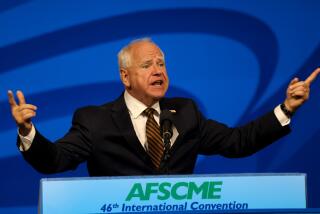He Holds the GOP to Its Belief in Individual Rights
As head of the gay Republican Log Cabin Group based in Washington, D.C., Richard Tafel has been called everything from an Uncle Tom to a Nazi. He is attacked by both the left, by the gay community, as a traitor, and by the right, by religious conservatives. He describes himself as a “Party Crasher,” the title of his new book from Simon & Schuster.
Question: Gay people and organizations call Republicans Nazis and liken you to a “Jew in the Nazi Party.” Is that the worst you’ve been called?
Answer: Just about. I’ve also been called “Uncle Tom” by Barney Frank, the senator. I’ve also heard, “You’re working for my own holocaust.”
Q: What’s the deepest misconception?
A: That I’m somehow working with gay people to oppress gay people. But I believe that by staying and fighting within the Republican Party, I am changing the Republican Party for gay people. The irony is that I’m also changing the Republican Party so that it’s better for itself.
Q: One of your big frustrations is that the gay leadership is more radical than the average gay voter.
A: If one of three gays generally votes Republican--and that’s the statistic--we certainly don’t see one-third of gay leadership in Washington, or anywhere else, with a Republican perspective. The average gay person is much more moderate than the gay leaders, who are much more on the left.
Q: You’re attacked by the gay left and the religious right. What’s your take being in the middle of it?
A: Interestingly, I’ve discovered how similar both groups are. By knowing just one thing about a person, they think they know the person, and by knowing that one thing about them, can demonize them. You say “Republican” to a liberal gay activist, they’ll make a face or screech or whine or say, “Republicans cannot be good.” And if you say “gay” to someone from the religious right, they immediately do the same thing--scream “Immoral!” or “Gays are going to destroy the country.” Both sides are intolerant. The other irony is that they like each other the way they are. They like polarizing the extremes.
Q: You said some sort of peak was reached during the Washington march in 1992 when outspoken lesbian comedienne Lea DeLaria made a salacious sexual remark about Hillary Clinton onC-SPAN.
A: It was the high point of liberalism, in that moment. Comments like that are offensive to most gay people. And I think gays in general are much more questioning that Democrats are going to solve all the problems, marches are going to solve it, that a Democratic president is going to solve it.
Q: Pat Buchanan, I gather, actually did a favor for gays when he railed during the 1992 Republican Convention about a “Cultural War in America.”
A: That’s when the Republican gay movement began. Though there were gay Republican clubs going back to the late ‘70s, the national office came almost directly out of Buchanan’s speech. At that time, many gay Republicans worked quietly in the party and felt they didn’t need to make sexual orientation an issue. But Pat Buchanan certainly did, and they knew they had to respond. So it mobilized the movement.
Q: Project the Democratic and Republican Parties five or 10 years down the pike.
A: I think the Republican Party will move in the direction of being more inclusive. The religious right has peaked and is on the down slide. And the Democratic Party, when they see the Republicans doing better, will start delivering more. When Republicans are more pro-gay, the Democrats will move in that direction. So it sort of hinges on what happens in the Republican Party.
Q: You say gay people are missing the boat not being Republican, that Republicanism is actually more beneficial.
A: I argue that the Republican tradition of individual rights and individual responsibility, having less government and a free market mentality, lead to more free people. Especially minority groups and gays. And I think that gay people have thrived under free markets and thrived being given individual responsibility, whether it’s entrepreneurship or taking control of their lives.
More to Read
Sign up for our Book Club newsletter
Get the latest news, events and more from the Los Angeles Times Book Club, and help us get L.A. reading and talking.
You may occasionally receive promotional content from the Los Angeles Times.








